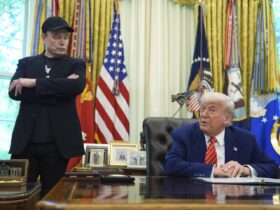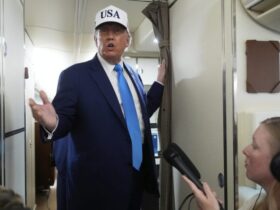A federal appeals court ruled Friday that the Trump administration may ban The Associated Press from the Oval Office and other limited spaces for now, pausing a judge’s order to return the wire service’s access.
In a 2-1 decision, the U.S. Court of Appeals for the District of Columbia temporarily blocked U.S. District Judge Trevor McFadden’s April 8 order deeming unlawful AP’s exile from the press pool, a small group of journalists who document the president’s movements and statements in and around the White House.
The White House’s exclusion of AP stemmed from the outlet’s refusal to use the term Gulf of America in its popular stylebook.
“The White House is likely to succeed on the merits because these restricted presidential spaces are not First Amendment fora opened for private speech and discussion,” Judge Neomi Rao wrote in an opinion joined by Judge Gregory Katsas, both appointees of President Trump. “The White House therefore retains discretion to determine, including on the basis of viewpoint, which journalists will be admitted.”
The judges said that, without a stay, the government would suffer irreparable harm because the injunction “impinges on the President’s independence and control over his private workspaces.”
McFadden, also a Trump appointee, ordered the Trump administration to reinstate AP’s access to the Oval Office, Air Force One and other small spaces that hold a limited number of officials and journalists.
The AP’s spot in the president’s press pool has traditionally been secured daily, both at the White House and when the president is traveling. Its reporters are usually granted access in a tradition dating back decades.
“The AP and the district court again lean heavily on the history of the press pool as an institution,” Rao wrote. “But the AP cannot adversely possess a seat in the Oval Office, no matter how long its tradition of access.”
The panel did not pause the portion of McFadden’s order restoring AP’s access to the East Room, noting that it does not share the “hallmarks” of spaces like the Oval Office.
In a dissenting opinion, Judge Cornelia Pillard said that participation in the press pool or broader White House press corps has never been conditioned on a news organization’s viewpoint “until now.”
“The panel’s stay of the preliminary injunction cannot be squared with longstanding First Amendment precedent, multiple generations of White House practice and tradition, or any sensible understanding of the role of a free press in our constitutional democracy,” the Obama appointee wrote.
The Justice Department had argued that the spaces from which the White House sought to exclude the AP are not a press facility like the Brady Press Briefing Room and are intended for the president’s personal use. Plus, presidents have the “personal autonomy” to decide to whom they reveal their minds.
Charles Tobin, a lawyer for the AP, argued that the White House can’t single out an outlet for exclusion from the pool based solely on its viewpoints, though he acknowledged that it’s the president’s prerogative to revoke AP’s daily spot in the press pool.
After McFadden ruled in the AP’s favor, the White House removed the spot typically reserved for wire services from the press pool, instead making those outlets eligible for selection as part of the pool’s daily print-journalist rotation.
Patrick Maks, a spokesperson for AP, said in a statement, “we are disappointed in the court’s decision and are reviewing our options.” The Hill requested comment from the White House.
















Leave a Reply